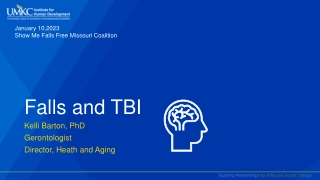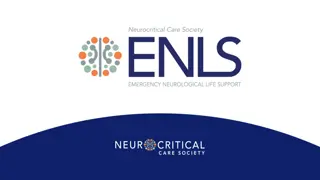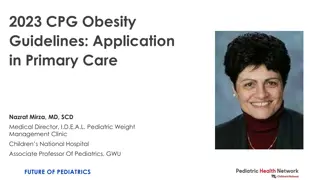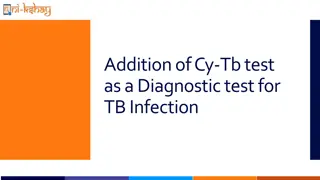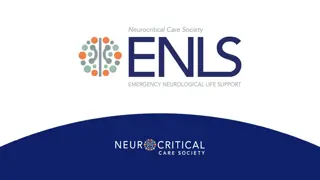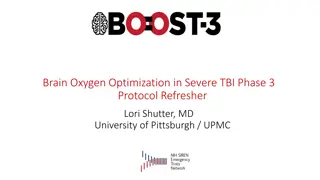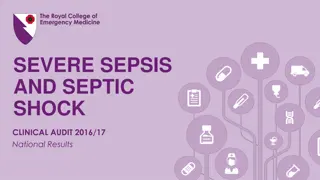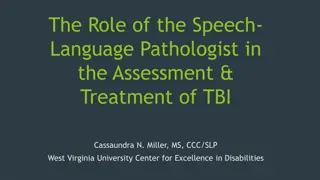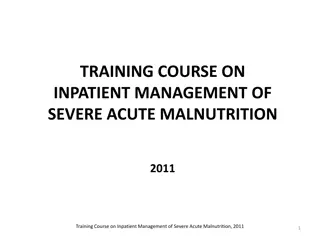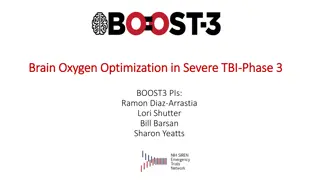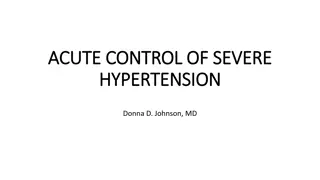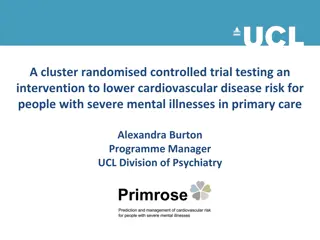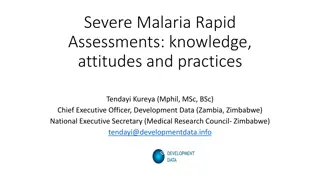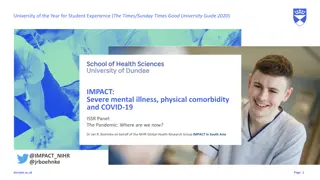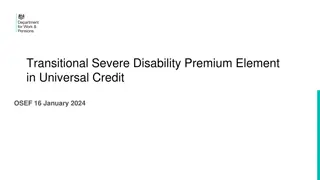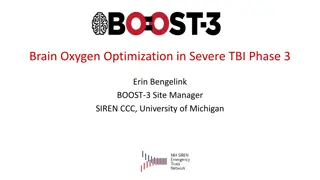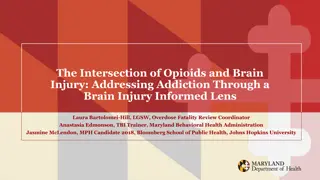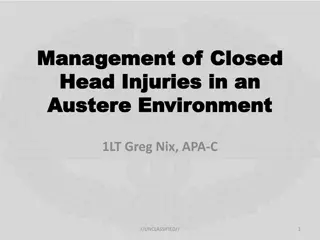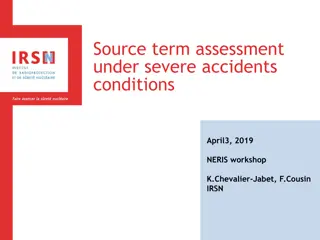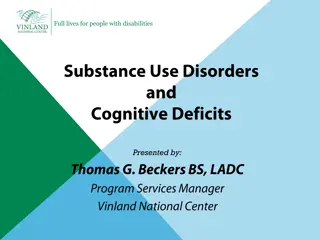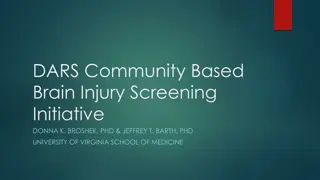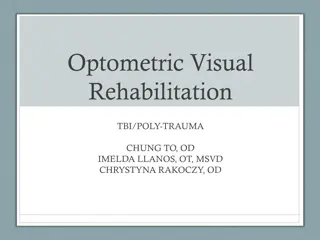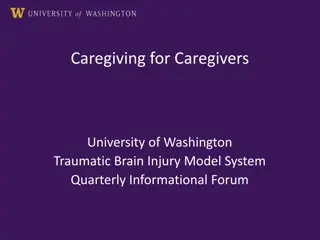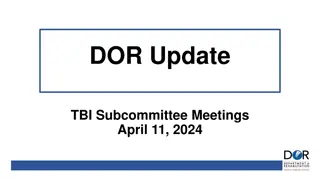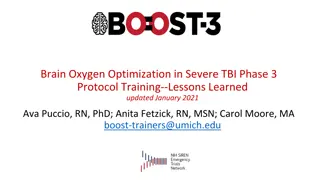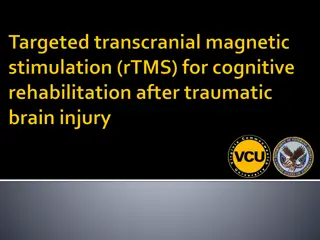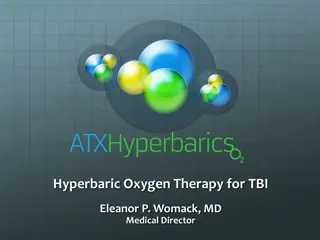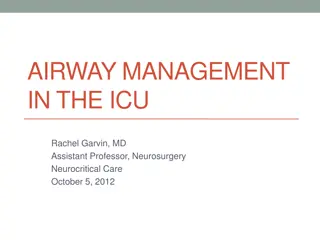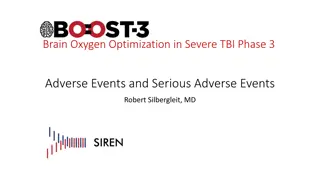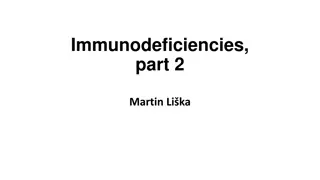Falls and TBI
January 10, 2023 Show Me Falls Free Missouri Coalition event to learn about TBI, falls, and aging. Presented by Kelli Barton, PhD, Gerontologist, Director of Health and Aging.
5 views • 15 slides
ENLS Version 5.0 Pharmacotherapy Pearls and Hyperosmolar Therapy Overview
This content delves into the pharmacotherapy pearls of ENLS Version 5.0, highlighting medication characteristics, adverse effects, and optimal pharmacotherapy strategies for acute neurological injuries. It specifically focuses on Hyperosmolar Therapy, comparing options like Mannitol and Sodium Chlor
1 views • 41 slides
2023 CPG Obesity Guidelines: Application in Primary Care and Impact on Pediatric Health
Application of the 2023 CPG Obesity Guidelines in primary care is crucial due to the increased prevalence of obesity among children, with 19% affected in the US. This guideline update is necessary as the last guidelines were published in 2007 and there is now more data available, including RCTs and
5 views • 23 slides
Implementation of Cy-Tb Test for TB Diagnosis and Treatment Prioritization
In the 2023-24 program, a new test type called Cy-Tb has been introduced alongside TST and IGRA for diagnosing TB infection. This addition aims to facilitate the identification of individuals requiring preventive treatment, particularly in high-risk groups. By selecting "Diagnosis of TBI" as the rea
1 views • 11 slides
ENLS Version 5.0 Pharmacotherapy Pearls: Hyperosmolar Therapy Case Study
In this segment of ENLS Version 5.0 Pharmacotherapy Pearls, a case study is presented focusing on hyperosmolar therapy for intracranial pressure (ICP) control in a 25-year-old male with traumatic brain injury (TBI). The patient has received multiple doses of sodium chloride and mannitol within 24 ho
0 views • 41 slides
Understanding Air Masses, Fronts, and Severe Weather in Earth Science
In Chapter 20 of Earth Science, we delve into the dynamics of air masses, fronts, and severe weather. Meteorologists study the movement and characteristics of air masses to predict weather changes. Air masses, defined by their temperature and humidity, interact at fronts, leading to precipitation an
0 views • 7 slides
Brain Oxygen Optimization in Severe TBI - Protocol Summary
In the severe traumatic brain injury (TBI) protocol, intracranial monitors measuring ICP and PbtO2 are placed within 12 hours of injury. Procedures include FiO2 challenges to check PbtO2 reliability and assess cerebral physiology. Challenges involving FiO2, MAP, and CO2 help guide ventilator setting
2 views • 27 slides
National Audit Results for Severe Sepsis and Septic Shock 2016/17
This presentation outlines the national results of a clinical audit conducted in 2016/17 regarding the management of severe sepsis and septic shock in Emergency Departments (EDs). The audit objectives include benchmarking current performance, facilitating national and peer comparisons, identifying a
0 views • 25 slides
Speech-Language Pathologist's Role in TBI Assessment & Treatment
Speech-language pathologists play a crucial role in assessing and treating traumatic brain injuries (TBI) which affect millions annually, with significant impact on children. SLPs collaborate with medical specialists, provide screenings, comprehensive evaluations, treatment development, and advocacy
0 views • 44 slides
Managing Physical Health in Severe Mental Illness with a Focus on Diabetes
This educational material presents a comprehensive slide set designed to aid in the management of physical health in individuals with severe mental illness, focusing on diabetes. It includes insights on the challenges faced by healthcare professionals, learning objectives on diabetes management, and
0 views • 14 slides
Inpatient Management of Severe Acute Malnutrition Training Course 2011
This training course focuses on inpatient management of severe acute malnutrition, teaching procedures outlined in the national Community-Based Management of Severe Acute Malnutrition Guidelines. The training aims to reduce case fatality rates significantly and is designed for physicians, senior nur
0 views • 9 slides
Brain Oxygen Optimization in Severe Traumatic Brain Injury (BOOST3) Trials Overview
Overview of the BOOST3 trials focusing on brain oxygen optimization in severe traumatic brain injury patients. The trials involve multiple PIs, training sessions, and hands-on ancillary studies. Various design principles and organizational values are emphasized, with grant awards distributed to diff
0 views • 13 slides
Management of Severe Hypertension in Maternal Health
Learn about the critical management of severe hypertension in maternal health, including the acute control of hypertension, risks of maternal deaths, guidelines for treating severe hypertension, medication recommendations, and essential tips for optimal blood pressure control during pregnancy.
0 views • 6 slides
Cluster Randomised Controlled Trial for Cardiovascular Disease Risk in Severe Mental Illness
A cluster randomised controlled trial is being conducted to test an intervention aimed at reducing cardiovascular disease risk for individuals with severe mental illnesses in primary care settings. Led by Professor David Osborn at UCL Division of Psychiatry, the study is funded by the National Insti
0 views • 21 slides
Management of Severe Acute Malnutrition in Children: A Retrospective Study in Johannesburg Health District
Severe Acute Malnutrition (SAM) in children aged 6-59 months is a critical public health concern in Johannesburg, South Africa. This study retrospectively analyzes the classification and management of SAM cases by professional nurses in primary health care facilities. The research highlights the imp
0 views • 14 slides
Understanding Severe Mental Illness in Mothers: Impacts and Support
Mothers with severe mental illnesses like Schizophrenia face unique challenges in parenting. Support from partners, family, and the community is crucial for their well-being. Despite the difficulties, with proper treatment and support, women with severe mental illnesses can effectively fulfill their
3 views • 23 slides
Severe Malaria Rapid Assessments: Knowledge, Attitudes, and Practices
This presentation discusses severe malaria rapid assessments conducted by Development Data in Uganda and Zambia. The assessments aimed to improve severe malaria case management at community and lower health facility levels. Key findings include knowledge levels among health workers, transitioning kn
0 views • 20 slides
Impact of Severe Mental Illness, Physical Comorbidity, and COVID-19 in South Asia
The research funded by the National Institute for Health Research aims to address the mortality gap and health inequalities faced by individuals with severe mental illnesses in South Asia. The study focuses on improving outcomes for mental and physical multimorbidity, reducing depression and anxiety
0 views • 9 slides
Changes to Transitional Severe Disability Premium Element in Universal Credit
Responding to a High Court judgment, changes are being made to the Transitional Severe Disability Premium Element in Universal Credit. Claimants qualifying for the Severe Disability Premium will receive additional amounts reflecting other disability premiums from legacy benefits. This adjustment aim
1 views • 7 slides
Brain Oxygen Optimization in Severe TBI Phase 3: BOOST-3 Study Details at University of Michigan
Explore the BOOST-3 trial led by Erin Bengelink, focusing on brain oxygen optimization in severe Traumatic Brain Injury (TBI) Phase 3. Discover study materials, milestones, regulatory parameters, and training resources to facilitate your involvement in this crucial research project. Access the BOOST
1 views • 22 slides
The Intersection of Opioids and Brain Injury: Addressing Addiction Through a Brain Injury Informed Lens
Exploring the correlation between traumatic brain injury (TBI) and the opioid crisis, this content delves into the alarming statistics of opioid overdoses and their impact on individuals with brain injuries. Highlighting the overlap and consequences of these two major health issues, it sheds light o
0 views • 45 slides
Management of Closed Head Injuries in an Austere Environment Overview
Understanding the pathophysiology of brain injuries, including intracranial pressure changes and specific injuries such as traumatic brain injury (TBI), skull fractures, brain bleeds, and diffuse axonal injuries. It covers classifications, diagnosis, and treatment approaches for mild/concussion, mod
0 views • 27 slides
Business Plan for Incubation at FIST-TBI, IIT Patna
Providing a comprehensive format for a business plan tailored for incubation at FIST-TBI, IIT Patna, focusing on mandatory sections, value proposition, and key considerations for potential applicants. The format aims to guide entrepreneurs in presenting their ideas and business concepts in a concise
0 views • 14 slides
Understanding Source Term Assessment in Severe Nuclear Accidents
Delve into the complexities of source term assessment under severe accidents conditions, focusing on core degradation, containment pressure buildup, radioactive species release, safety systems, iodine-related phenomenology, and assessing the radioactive source term's impact on the environment. This
0 views • 21 slides
Full Lives for People with Disabilities - Addressing Traumatic Brain Injury
Traumatic Brain Injury (TBI) presents a significant public health concern in the United States, often termed as the silent epidemic due to its hidden nature. This condition affects thinking and memory, impacting individuals' lives profoundly. Resources such as "The Essential Brain Injury Guide" shed
0 views • 23 slides
Understanding the Use of Contact Lenses in Photophobia Associated with mTBI
Photophobia in patients with mild traumatic brain injury (mTBI) can be debilitating, with up to 59% of military personnel reporting sensitivity to light after a TBI event. Contact lenses, sunfilters, and tinted glasses can help manage photophobia symptoms. Mechanisms underlying photophobia involve t
0 views • 10 slides
Community-Based Brain Injury Screening Initiative at University of Virginia School of Medicine
Screening for traumatic brain injury (TBI) is crucial for identifying individuals with chronic TBI symptoms that impact productivity and social integration. The initiative aims to develop a brief, easy-to-administer TBI screening measure to assist community health organizations in identifying and re
0 views • 13 slides
Cognitive and Behavioral Management Strategies for Traumatic Brain Injury Patients
This presentation focuses on addressing challenging cognitive, behavioral, and personality issues associated with traumatic brain injury (TBI). It outlines cognitive issues such as attention, speed of processing, learning, memory, and executive functioning. Cognitive management strategies include te
0 views • 18 slides
Optometric Visual Rehabilitation for TBI/Poly-Trauma Patients: Principles and Considerations
Optometric Visual Rehabilitation involves the comprehensive treatment of visual system disorders, including binocular vision, accommodation issues, and more. Neural plasticity plays a key role in neuro-rehabilitation, allowing the brain to adapt and learn. The 10 principles of neural plasticity guid
0 views • 29 slides
Severe Weather Project Summary for Week 34
Week 34 of the Severe Weather Project focused on expanding development and evaluation of severe weather potential model guidance. The project aimed to develop experimental forecast tools for severe weather at Week 3-4 time range, utilizing a hybrid model and SCP (Supercell Composite Parameter). The
0 views • 21 slides
Understanding Caregiving for Traumatic Brain Injury Survivors
Caregiving for individuals with Traumatic Brain Injury (TBI) is a crucial yet challenging role undertaken by family members or friends. The responsibilities can be overwhelming, impacting both the survivor and the caregiver's well-being. This presentation highlights the needs of caregivers, survivor
0 views • 22 slides
DOR Update and TBI Subcommittee Meetings - April 11, 2024
Department of Rehabilitation's latest updates include changes to its name, seeking feedback for a new name, staffing details, TBI State Partnership Program grants, and TBI Providers information. The TBI Subcommittee is enhancing services for survivors and caregivers to promote partnerships and infor
0 views • 17 slides
Lessons Learned in Brain Oxygen Optimization for Severe TBI Phase 3 Protocol
Screening, enrollment, and inclusion/exclusion criteria insights for the Brain Oxygen Optimization in Severe Traumatic Brain Injury (TBI) Phase 3 Protocol are discussed. Key points include handling urgent patient queries, guidelines on hypotension and hypoxia, pupil assessment considerations, and su
0 views • 20 slides
Interpreting the Use of 'Severe' in NPPF Impact Assessment
Understanding the term 'severe' in the National Planning Policy Framework (NPPF) for impact severity and its implications within the industry. The NPPF guidelines emphasize the importance of addressing significant impacts on the transport network and distinguishing between severe and significant imp
0 views • 14 slides
Cognitive Deficits and Treatment Options Following Traumatic Brain Injury
Traumatic Brain Injury (TBI) can lead to a range of cognitive deficits and long-term complications, affecting communication, sensory perception, behavior, and more. Severe TBI is associated with EEG frequency shifts and cognitive impairments similar to Alzheimer's disease and schizophrenia. While tr
0 views • 34 slides
Hyperbaric Oxygen Therapy for Traumatic Brain Injury (TBI) - Benefits and Mechanisms Explained
Hyperbaric Oxygen Therapy (HBOT) is a cutting-edge treatment that involves providing oxygen in a pressurized environment to enhance oxygenation of body tissues beyond what red blood cells can deliver. This therapy, administered under controlled conditions, offers various physiological and cellular b
0 views • 15 slides
Airway Management in the NeuroICU: Importance and Strategies
Understanding the crucial role of airway management in the NeuroICU is essential for preventing secondary brain injury and addressing respiratory complications in neurologically-injured patients. This presentation covers the significance of airways, common issues, evaluation techniques, adjuncts, an
0 views • 45 slides
Brain Oxygen Optimization in Severe TBI: Adverse Events Analysis
This study led by Dr. Robert Silbergleit focuses on adverse events in brain oxygen optimization for severe Traumatic Brain Injury (TBI) patients. It outlines key points for reporting adverse events, discusses relatedness algorithms, and presents scenarios to analyze adverse events occurrence post-en
0 views • 24 slides
Severe Weather Executive Briefing - El Paso County - Pikes Peak Region
Severe weather events in the Pikes Peak region of El Paso County from June 8th to June 23rd, 2023, led to significant damages and emergency response activities. The area experienced above-average precipitation levels, severe thunderstorms, floods, and tornadoes, resulting in extensive damages to inf
0 views • 9 slides
Understanding Primary Immunodeficiencies - Part 2
Primary immunodeficiencies are a group of disorders characterized by defects in the immune system. Severe Combined Immunodeficiency (SCID) and related conditions like JAK-3 deficiency, IL-7 R or CD45 deficiency, and Omenn syndrome are discussed in detail, highlighting the genetic basis, clinical man
0 views • 41 slides
